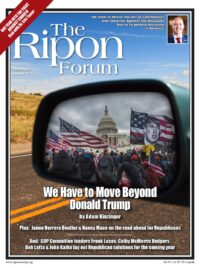
The reliable flow of information is one of the most essential battlegrounds in the fight to stabilize democracies around the world. The rise of disinformation campaigns, authoritarian crackdowns on press freedoms, and the decline in local journalism in America and globally present three especially critical obstacles to that reliable flow.
The danger for democracy in each of these realities is that citizens lack access to the facts they need to make informed decisions. They lose the knowledge required to hold their leaders and governments accountable. And, even worse, a lack of reliable information undermines the trust that a democracy depends upon for stability.
Let’s start with disinformation campaigns. They have intensified during the Covid-19 pandemic, with nations like China and Russia spreading falsehoods or distortions about the virus and how countries might be responding to it. But disinformation campaigns started long before then, with organizations like Russia’s Internet Research Agency capitalizing upon elections in various nations to manipulate citizens and sow distrust.
Disinformation campaigns have intensified during the Covid-19 pandemic, with nations like China and Russia spreading falsehoods or distortions about the virus and how countries might be responding to it.
The United States is hardly the only target of disinformation campaigns as well as cyberattacks. This modern warfare is being waged from Europe to Africa to Latin America. And disinformation campaigns can originate within our own country and lead to violence and death, as we tragically saw on January 6.
Along with waging disinformation campaigns, authoritarian leaders are on the prowl against freedom of the press. As one example, the Chinese Communist Party controls news reporting via direct ownership, accreditation of journalists, harsh penalties for public criticism, and daily directives to media outlets and websites that guide coverage of breaking news stories. They also have blocked numerous websites for years, including major news and social media hubs.
Freedom of the press may actually be the most integral freedom. A free, vibrant media provides a way for citizens to stay informed, engage in their communities, consume and civilly debate ideas, and hold governments accountable.
Yet even in nations where a free press is valued, local journalism is in decline. In our own country, more than 2,000 newspapers have closed their doors since 2004. Their collapse has left behind “news deserts” or “ghost newspapers.” In turn, that has led to fewer journalists reporting on local and state governments, which is one of their most important roles. Between 2008 and 2018, newsroom employment fell to 38,000 workers from 71,000.
Recommendations
So, how should we combat these trends? A new Bush Institute policy brief, Disinformation: Democracies Require a Reliable Flow of Information, presents recommendations in each area. Here are some of the proposals:
Disinformation
*Congress should adequately fund entities like the State Department’s Global Engagement Center so it can constantly monitor and expose technological threats, whether from deep-fake videos, automated bots, or fake news about the COVID-19 pandemic.
*The White House should lead an effective international response among the world’s democracies.
U.S partnerships with countries like Australia, Japan, and South Korea, as well as multilateral structures like NATO, are essential to stopping the cyberattacks and disinformation campaigns that threaten all democracies to varying degrees.
*Social media companies shut down content during the recent U.S. election that spread misinformation about how, where, and when we could vote, as well as labeling information as false even if it comes from some of the highest offices in the land. Next, social media companies must vigorously enforce their own terms of service against disseminating disinformation, strengthen internal infrastructure for identifying “fake news” and accounts, and further develop partnerships with firms that rate content for reliability and truthfulness.
*Legislators should re-examine the federal statutes that appropriately let the internet develop without much interference. Technologies have so rapidly changed that Congress should reconsider whether there are fair and limited ways for social media companies to be held responsible for the content that appears on their sites.
Congress should adequately fund entities like the State Department’s Global Engagement Center so it can constantly monitor and expose technological threats, whether from deep-fake videos, automated bots, or fake news about the COVID-19 pandemic.
*State legislators and state education leaders should bolster our education system with effective media literacy courses. Starting early in their education, children need the skills to distinguish truth from fiction. This includes knowing how to consult multiple sources to verify the veracity of the information we consume.
Freedom of the press
*The Biden administration should prioritize freedom of the press when challenging authoritarian leaders in places like Russia, Hungary, and China. This can be done through administration officials releasing public statements defending a free press, making press freedom a priority in official head-of-state meetings, and diplomats highlighting the role journalists play in a society.
*Congress must adequately fund the National Endowment for Democracy and organizations like the U.S. Agency for International Development. They work internationally to grow democratic institutions such as a free press.
*Legislators should provide the support that taxpayer-funded organizations like Voice of America, Radio Free Asia, and Radio Free Europe/Radio Liberty require to provide valuable, accurate information to people in nations that lack a free press and uncensored news.
The White House and Congress should especially protect and restore the independence of these organizations so their reputation for journalistic integrity is not compromised through domestic political interference. Their reporting is often a lifeline to people searching for freedom.
Local journalism
*Congress should stay clear of investing public dollars in newspapers, but legislators should consider giving news media organizations a temporary antitrust exemption so the industry can negotiate with social media companies. The aim would be for news organizations to get paid for the content posted on social media sites.
*Congress should rewrite tax laws so newspapers could more easily become nonprofit institutions, if they like. This could help grow more successful reporting operations in communities and states.
*Congress should consider making newspaper subscriptions tax deductible, as they are for public broadcasting memberships.
Conclusion
In each of these cases – combating disinformation campaigns, promoting a free press, and preserving local media operations – lawmakers and policymakers from Washington to state capitals can sustain the reliable flow of information that democracies require to keep their people informed.
William McKenzie serves as senior editorial advisor at the George W. Bush Institute. He is the author of the policy brief, “Disinformation: Democracies Require a Reliable Flow of Information,” from which this essay is adapted.




